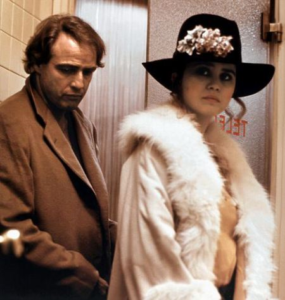
Still from Last Tango in Paris.
Last Tango in Paris is a 1972 Franco-Italian erotic film about a recently widowed American.  The American, played by Marlon Brando, starts a relationship with a young Parisian woman, Maria Schneider. The idea for the film came from director Bernardo Bertolucci, developed from his sexual fantasies about meeting a beautiful woman on the street and having sex with her without ever knowing her name or who she was.
Both the subject matter and the graphic portrayal of sex generated considerable controversy. Several groups condemned it, and the National Organization for Women denounced it as ‘male domination’.  Last Tango in Paris was banned for almost thirty years in Chile, re-cut on its initial release in the United Kingdom, and suppressed in Portugal and South Korea. In Italy, Bertolucci was put on trial for ‘obscenity’, and local officials in the United States attempted to ban the film. Writers William F. Buckley and Harry Reasoner condemned it as ‘pornography described as art’.
The scandal centres around the anal rape scene. The 48 year-old Brando pinned down the 19 year-old Schneider, whilst using butter as lubricant. According to Schneider, the scene was Brando’s idea and was not included in the script she had agreed to. In spite of the controversy, Brando was nominated for an Academy Award for Best Actor and Bertolucci for Best Director.
Controversy flared up again when footage from a 2013 interview on Dutch TV show College Tour came to light. Bertolucci revealed he and Brando conspired on the scene – and on the idea of using butter – meaning Schneider was only informed when filming was about to take place. According to Bertolucci, they had thought of it over breakfast, seeing butter and a baguette. In his attempt to justify the decision, he claimed he wanted her reaction as a girl, not an actress. Bertolucci stated, ‘I didn’t want Maria to act her humiliation, her rage. I wanted Maria to feel, not to act, the rage and humiliation’.
Schneider was aware she would be filming a rape scene, as it was included in the original script.¬† But she was only made aware right before filming that butter would be a key factor, and¬†would take up almost half the scene. Bertolucci has admitted that the scene was not consensual. The most recent wave of controversy came after a different interview appeared on YouTube¬†in November 2016.¬†That video included a statement that those involved in the film¬†had ‚Äòabused [Schneider] psychologically and, who knows if also, physically…‚Äô.
In a 2007 interview with the Daily Mail, Schneider recounted how the film left her feeling ‘humiliated’ and ‘a little raped’. Though she stated that all the sex in Last Tango in Paris was simulated, the violation of trust was authentic. Schneider was forced to take part without warning of what was to occur, leaving her feeling sexually humiliated as a result. Schneider went on to say that, ‘They only told me about it before we had to film the scene and I was so angry. I should have called my agent or had a lawyer come to set because you can’t force someone to do something that isn’t in the script, but at the time, I didn’t know that’. Schneider believed the film had ruined her life and cited it as her only regret, believing Bertolucci stole her youth.
The scene is both troubling and problematic. It features a non-consensual sexual act against a young actress, and also highlights¬†how actors can be forced into actions against their will in the pursuit of a higher ‘artistic truth‚Äô. In this case, the truth being that the lines between reality and fiction become blurred.
Both Brando and Bertolucci have tried to excuse their actions over the years. Schneider reported how, just after filming the scene, Brando said, ‘Maria, don’t worry, it’s just a movie’. Meanwhile, Bertolucci reiterated to the Italian ANSA news agency that Schneider was aware of the rape scene beforehand. ‘Some people thought, and think, that Maria wasn’t informed about the rape. False! Maria knew everything because she has read it in the script, where it was described, the only novelty was the idea of butter’.
This admission is troubling, showing Bertolucci is still unable to admit his wrongdoing and not understanding how she felt forced. A scene cannot be altered in such a drastic manner without the full consent of the individuals involved.  The fact that it was a highly sexual scene increases its problematic nature. Bertolucci has even called those who condemn the film ‘ridiculous’ and ‘naïve’, refusing to bear any responsibility or acceptance of how this affected Schneider for the rest of her life.
It was only when Bertolucci admitted the truth about the scene that the controversy received widespread attention. In spite of admitting she felt violated and manipulated, Schneider was largely ignored and silenced. Attention was only paid when one of the perpetrators revealed what had happened. She did not live to see her treatment and ordeal in the scene finally vilified. Instead, she died in 2011 after having spent her life struggling with addiction and mental health problems. She did not live long enough to be heard or to hear global, widespread condemnation.
-Emma Bryning
Junior Girl
Girl Museum Inc.
